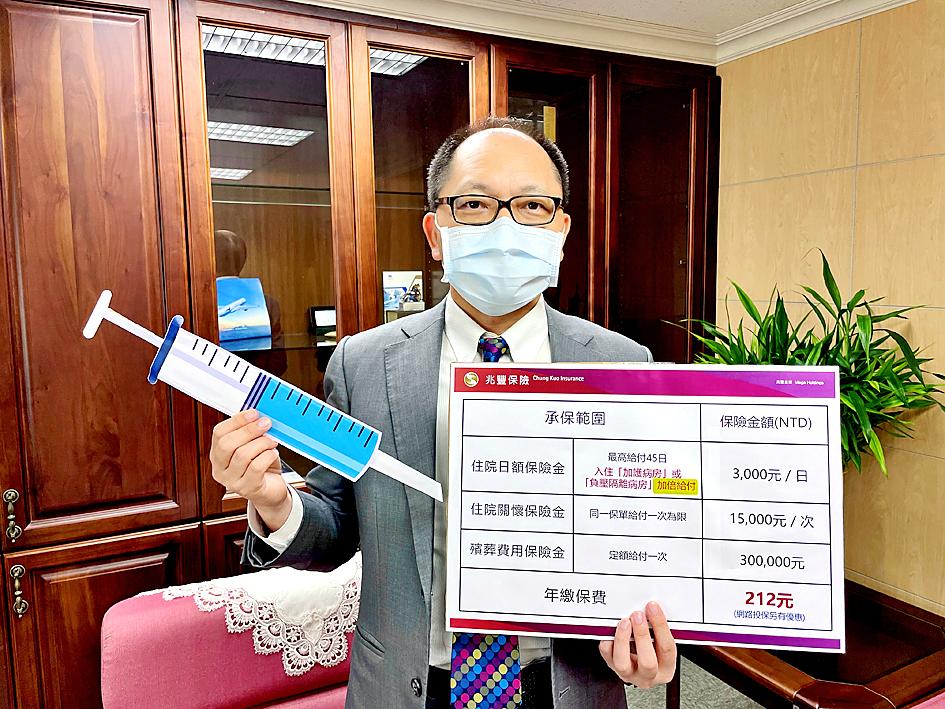A total of 465,689 insurance policies were sold online in Taiwan in the first quarter, down 25 percent from a year earlier, as demand for international travel insurance and interest-sensitive annuities fell due to border controls and falling returns respectively, Financial Supervisory Commission (FSC) data showed.
Property insurers sold 437,772 policies online, down 20 percent from a year earlier, while life insurers reported 61 percent less in sold policies at 27,917, the data showed.
Life insurer’s interest-sensitive annuities took a hit from reduced declared interest rates, which decide the monthly bonus that policyholders could earn, the commission said in a statement.

Photo courtesy of Chung Kuo Insurance Co
A total of 821 interest-sensitive annuities were sold during the January-to-March period, with first-year premiums of NT$145 million (US$5.23 million), both halved from a year earlier, the data showed.
Travel insurance products also lost momentum due to ongoing border controls amid the COVID-19 pandemic, with 13,136 policies sold last quarter, down 44 percent from a year earlier. Their first-year premiums were NT$3.29 million, also down 68 percent year-on-year, the data showed.
Customers still purchased travel insurance for their domestic trips, but sales were lower due to cheaper insurance charges, the commission said.
As a result, life insurers saw their combined first-year premiums fall by 46 percent year-on-year to NT$158 million in the first three months, the data showed.
On the other hand, property insurers’ first-year premiums rose 19 percent annually to NT$466 million, as their losses from travel insurance sales were offset by double-digit percentage growth in sales of scooter insurance, the data showed.
About 215,000 scooter insurance policies were sold, with premiums totaling NT$183 million in the first quarter, nearly double that of a year earlier, as more scooter owners preferred buying the compulsory insurance and additional coverage online for discounts, the commission said.
Overall first-year premiums of all online insurance policies declined 9 percent to NT$624 million in the first three months, it said.
Online sales of insurance might pick up this quarter, as insurance companies began selling virus and medical insurance against COVID-19 online from this month, which could attract customers, the commission said.

UNCERTAINTY: Innolux activated a stringent supply chain management mechanism, as it did during the COVID-19 pandemic, to ensure optimal inventory levels for customers Flat-panel display makers AUO Corp (友達) and Innolux Corp (群創) yesterday said that about 12 to 20 percent of their display business is at risk of potential US tariffs and that they would relocate production or shipment destinations to mitigate the levies’ effects. US tariffs would have a direct impact of US$200 million on AUO’s revenue, company chairman Paul Peng (彭雙浪) told reporters on the sidelines of the Touch Taiwan trade show in Taipei yesterday. That would make up about 12 percent of the company’s overall revenue. To cope with the tariff uncertainty, AUO plans to allocate its production to manufacturing facilities in

Taiwan will prioritize the development of silicon photonics by taking advantage of its strength in the semiconductor industry to build another shield to protect the local economy, National Development Council (NDC) Minister Paul Liu (劉鏡清) said yesterday. Speaking at a meeting of the legislature’s Economics Committee, Liu said Taiwan already has the artificial intelligence (AI) industry as a shield, after the semiconductor industry, to safeguard the country, and is looking at new unique fields to build more economic shields. While Taiwan will further strengthen its existing shields, over the longer term, the country is determined to focus on such potential segments as

TAKING STOCK: A Taiwanese cookware firm in Vietnam urged customers to assess inventory or place orders early so shipments can reach the US while tariffs are paused Taiwanese businesses in Vietnam are exploring alternatives after the White House imposed a 46 percent import duty on Vietnamese goods, following US President Donald Trump’s announcement of “reciprocal” tariffs on the US’ trading partners. Lo Shih-liang (羅世良), chairman of Brico Industry Co (裕茂工業), a Taiwanese company that manufactures cast iron cookware and stove components in Vietnam, said that more than 40 percent of his business was tied to the US market, describing the constant US policy shifts as an emotional roller coaster. “I work during the day and stay up all night watching the news. I’ve been following US news until 3am

COLLABORATION: Given Taiwan’s key position in global supply chains, the US firm is discussing strategies with local partners and clients to deal with global uncertainties Advanced Micro Devices Inc (AMD) yesterday said it is meeting with local ecosystem partners, including Taiwan Semiconductor Manufacturing Co (TSMC, 台積電), to discuss strategies, including long-term manufacturing, to navigate uncertainties such as US tariffs, as Taiwan occupies an important position in global supply chains. AMD chief executive officer Lisa Su (蘇姿丰) told reporters that Taiwan is an important part of the chip designer’s ecosystem and she is discussing with partners and customers in Taiwan to forge strong collaborations on different areas during this critical period. AMD has just become the first artificial-intelligence (AI) server chip customer of TSMC to utilize its advanced